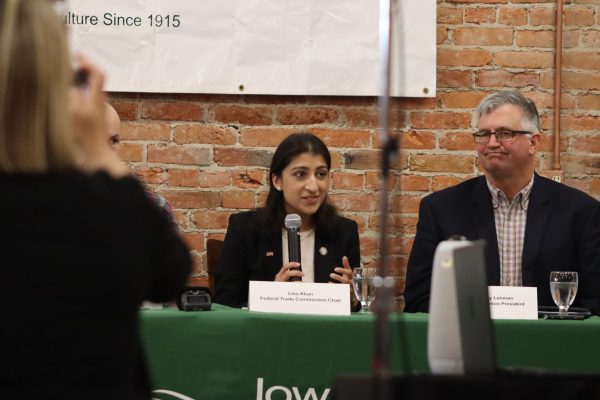City Council debates more student housing in Ames, among others
June 27, 2017
Student housing and the use of massage parlors for human trafficking both came up last night at the Ames City Council meeting.
The housing competition between serving student populations and community populations came up during a talk on approving the rezoning of a property at 398 South 500th Avenue. The property was up for rezoning with the intention of being set for residential apartments.
The council discussed the need or lack of need for more residential apartments, and whether they should be student or family based.
Council Member Tim Gartin was concerned that students still worry about high rates and low apartment care and quality because demand is so high. Council Member Bronwyn Beatty-Hansen was concerned that the area is wrong for students – it’s far west in Ames and CyRide does not go there so automobile traffic could increase. She and Council Member Gloria Betcher thought that recent developments may have caught up with ten years of enrollment growth, so demand and prices could go down, particularly with rumors that numbers are leveling off, if not dropping, for the coming year.
Gartin responded that there isn’t place for 800 bedrooms anywhere closer, and that development would eventually have to happen at the edges. It could also bring students back to Ames who live in surrounding communities. Council Member Peter Orazem said the data shows that there is a significant number of people who do commute to work in Ames.
Orazem, who attended telephonically, used Google Maps to compare the property distance to the Memorial Union. It came out almost even with The Grove on the east side of Ames. Orazem also said that it could promote housing return to being family homes instead of apartments.
The vote came out 3-3 on the property’s rezoning, so the proposal was denied. The property had been annexed by the City for future development, which will now be delayed for future proposals.
Earlier in the night a community member concerned with human trafficking requested the city look into regulating massage parlors.
The member mentioned Johnston is the only city in the state to currently have regulations, but the state recently gave municipalities the power to address regulation and human trafficking.
Council Member Tim Gartin asked if human trafficking evidence had been found in any Ames parlors recently. He was told of two women were arrested last year for prostitution and one man convicted of sexual assault within a parlor last year.
In May 2016, Xiao Zhang, 51, of Ames, and Zemei Guo, 49, of Ames, were both arrested. Zhang, an employee of Asian Health, was arrested on two counts of prostitution, an aggravated misdemeanor. Guo, an employee of May Spa, was arrested for practicing a massage without a license, a serious misdemeanor.
Genmu Cheng, 63, who co-owned Home Spa in Ames with his wife, was arrested on two counts of third-degree sexual abuse by forcible fondling in April 2016. Cheng was the salon’s only masseuse.
The motion to approve the Safe Community Resolution previously discussed and presented to the council (view the original discussion here) was passed by all members except Orazem, who proposed his own Resolution. The original resolution was an adaptation of the Iowa City Council’s resolution.
The resolution protects amnesty to undocumented immigrants when calling for emergency services or aiding in investigations. Ames Police Chief Charles Cychosz spoke in favor of the resolution as reaffirming policy the police department already has at a previous meeting.
Prior to 2014, when it was ruled illegal to hold people based on immigrant status, Story County had held undocumented immigrants for federal procedure.
“Our police do their job, not [Immigration and Customs Enforcement]’s job,” a community member said.
Orazem said he felt it was unfair to single out the police, and that part of becoming a police officer is to agree and swear to uphold federal, state and local law, including those of immigration. He proposed an adopted version, which acknowledges the international population, both visitor, immigrant and refugee, citizen, employee, educator and student.
















